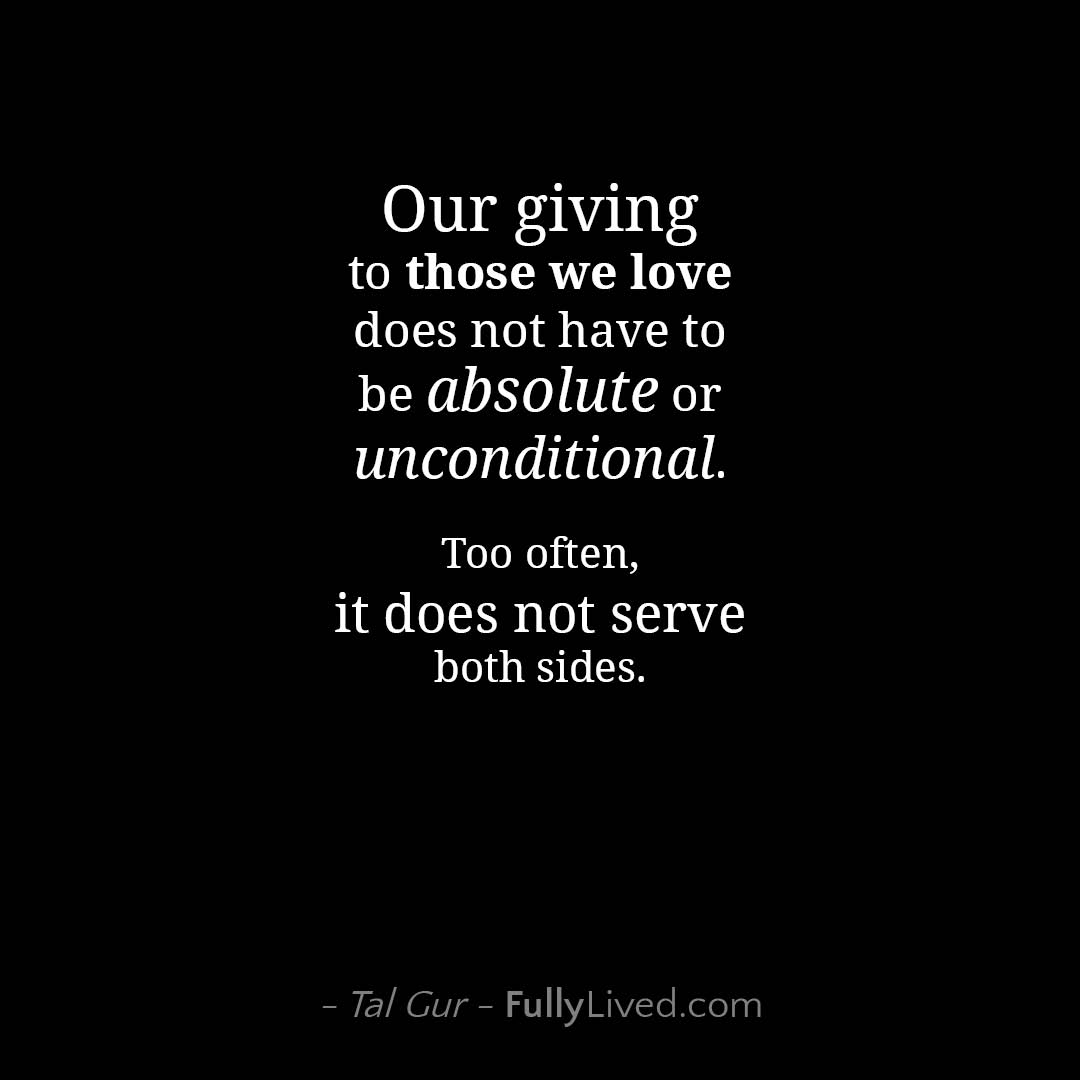Our giving to those we love does not have to be absolute or unconditional. Too often, it does not serve both sides.
Imagine a garden where you tend to delicate flowers. You water them, provide sunlight, and care for them with all your heart. Yet, despite your efforts, some flowers wither away, unable to thrive in your garden's conditions. In life, our love is like that garden, and the people we care for are the flowers. The quote reminds us that our giving, like the care we provide to flowers, doesn't have to be absolute or unconditional.
Consider this: if you pour all your water into one flower, neglecting the others, soon you'll find parched soil and wilted blossoms. Similarly, when we give everything we have without consideration for our own needs, the balance tips, leaving both parties depleted. It's not selfishness to reserve some water for yourself; it's wisdom.
Picture a seesaw where one side represents your needs, and the other side symbolizes the needs of those you love. For the seesaw to stay balanced, both sides require attention. If you keep giving endlessly to one side, the other side remains suspended, unattended. Eventually, the imbalance will lead to strain, perhaps even a collapse. Thus, the quote gently advises us to find equilibrium in our relationships, where giving and receiving flow harmoniously.
Think of a bank account where you deposit love, care, and support. Just as you cannot withdraw more money than you deposit, you cannot expect to give more than you have without facing emotional bankruptcy. It's about maintaining a healthy balance, knowing when to give and when to replenish your emotional reserves.
Imagine driving a car on a long journey. You diligently refuel when the tank nears empty, ensuring you reach your destination smoothly. Similarly, in relationships, it's crucial to refuel your emotional tank regularly. When you're running on empty, your ability to give diminishes, and resentment may start to creep in. By recognizing and honoring your own needs, you ensure that your capacity to love remains abundant.
Consider a lantern that illuminates a dark path. To shine brightly, it requires fuel. Our love is like that flame, and self-care is the fuel that keeps it burning. Neglecting our own well-being dims the light we can offer others. Thus, by prioritizing self-care, we not only nurture ourselves but also ensure that our love radiates brightly, illuminating the lives of those around us.
Picture a delicate ecosystem where every organism plays a vital role. Each creature gives and receives in balance, sustaining the harmony of the whole. Similarly, in our relationships, balance is key. By acknowledging our own needs while honoring the needs of others, we contribute to a thriving ecosystem of love and support.
In conclusion, the quote serves as a gentle reminder that our giving in relationships need not be absolute or unconditional. Just as a flower needs both sunlight and water to bloom, our relationships thrive when we find balance between giving and receiving. So, ask yourself: In which areas of my life do I need to restore balance?
* To gain more inspiration and motivation for your personal growth journey, I recommend visiting my SMART goals page, which offers a wide range of goal ideas to help you establish new aspirations and achieve greater success in life. This list was crucial in the development of my own life goals list, consisting of 100 goals that I pursued for ten years.
Chief Editor
 Tal Gur is an author, founder, and impact-driven entrepreneur at heart. After trading his daily grind for a life of his own daring design, he spent a decade pursuing 100 major life goals around the globe. His journey and most recent book, The Art of Fully Living, has led him to found Elevate Society.
Tal Gur is an author, founder, and impact-driven entrepreneur at heart. After trading his daily grind for a life of his own daring design, he spent a decade pursuing 100 major life goals around the globe. His journey and most recent book, The Art of Fully Living, has led him to found Elevate Society.





















